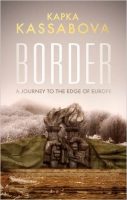Border: A Journey to the Edge of Europe
by Kapka Kassabova
(Granta, £14.99)
 There’s a passage early in this book in which the author hints at a moment of terror she will recount in detail later; a moment that might — or might not — have been all in the mind. It was a passage that at first I found irritating rather than tantalising; one that held me up rather than sped me on. Later, it seemed somehow appropriate: holding us up is one of the things borders do.
There’s a passage early in this book in which the author hints at a moment of terror she will recount in detail later; a moment that might — or might not — have been all in the mind. It was a passage that at first I found irritating rather than tantalising; one that held me up rather than sped me on. Later, it seemed somehow appropriate: holding us up is one of the things borders do.
Kapka Kassabova’s book is about the land where Bulgaria, Greece and Turkey run into one another; a land that, a century on from the dissolution of the Ottoman Empire (1300s to 1900s), is still feeling the aftershocks. In parts, she says, it’s a place “beautiful enough to give you a heart attack”; but it’s also one where people have suffered exile, military rule, border terror and poverty, interference and neglect. Myth and folklore endure — perhaps, she suggests, because at times only the imagination was free of state control.
As a child under communism, Kassabova saw the edge of this land when her parents, both scientists, took her on holidays from their home in Sofia to the southern beaches of Bulgaria. They went for the swimming and the sun. Many of the East Germans who joined them on the “Red Riviera” had a different aim: to sneak away from the sands at night, and into the dark forest known as the Strandja, where, they had been told, there was only a bit of barbed wire between them and freedom. Twenty-five years after she left Bulgaria (she now lives in Scotland), she returns to see what has become of these once-militarised border villages and towns, the rivers and forests that for two generations were off-limits.
Starting at the Black Sea, on the Bulgarian side of the border with Turkey, she travels through the Strandja ranges, on to the plains of Thrace and into the passes of the Rhodope Mountains — where, they say, Orpheus went into the Underworld — to finish “on the mirror side of the beginning — Strandja and the Black Sea.” Her account of that journey is about fences both on the ground and in the head; about the frontiers between the real and the imagined, between the scientifically proven and the remotely possible.
There are happenings that might be from the pages of García Márquez, including the nocturnal sighting of fireballs in Strandja: a phenomenon “so common that people accepted it as a law of nature”. There’s a cast of characters that wouldn’t disgrace Dickens: border guards and people smugglers, refugees and ritual fire-walkers, plant hunters and treasure hunters, spymasters who have retired and faith healers who are never out of work. Among those she meets are one of “yesterday’s killers”, a border guard who shows no remorse over the would-be escapers he “liquidated” in Soviet times, and a Kurdish refugee from Syria, who, when the author’s back is turned, pays for her lunch in a café.
On the ground, Kassabova is a difficult character for the locals to pigeonhole: she drives through villages where female solo travellers are unheard-of, where women prepare meals and then leave others to eat them. On the page, she segues seamlessly between myth and history, memoir and reportage. In a couple of passages, including one recounting an episode when she says she put her notebook down, she presents in direct speech lengthy conversations involving three or more voices. You believe their substance because, in the maxim of a 13th-century Sufic mystic and poet she quotes elsewhere, “If you are true, your words will be true.” Kassabova, you have no doubt, is true.
In a book where she’s intent on blurring borders and avoiding division, she does declare, towards the end, a preference for the people of the mountains over the people of the plains. The former have survived both a tougher terrain and a rougher history. In an echo of Henry James, she notes: “They seem to know what others don’t: kindness is the one thing that matters in the end.”
I’ve read a lot of good travel books lately. Border is a great one. But it’s more than that: it’s a big-hearted book for what seems an increasingly mean-spirited age. Kassabova describes the region she traverses as “the last border of Europe”. It might not be for long. Anti-establishment and anti-EU winds are blowing hard and fast across the Continent. The great European “project”, constructed in the aftermath of the Second World War, has never looked in so much danger of falling apart as it does now. At the far west of Europe, Brexit, we’re told, might necessitate a “harder” border on the island of Ireland — if not as hard as the wall with which Donald Trump wants to keep Mexicans out of the United States.
Border, then, is a a topical book. It’s an urgent one too, for it spells out the human consequences of nationalism and totalitarianism; of a narrow focus on identity and ethnicity; of divisions and fences and walls designed to keep “them” from “us”.
An edited version of this review appeared first in The Daily Telegraph
Telegraph review
